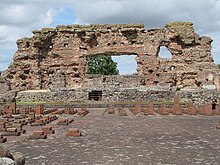Uriconium

Remains of the public baths, known as "The Old Work"
|
|
| Location | Wroxeter, Shropshire, England |
|---|---|
| Region | Britannia |
| Coordinates | 52°40′26″N 2°38′42″W / 52.674°N 2.645°WCoordinates: 52°40′26″N 2°38′42″W / 52.674°N 2.645°W |
| Type | Settlement |
Viroconium or Uriconium, formally Viroconium Cornoviorum, was a Roman town, one corner of which is now occupied by Wroxeter, a small village in Shropshire, England, about 5 miles (8.0 km) east-south-east of Shrewsbury. At its peak, Viroconium is estimated to have been the 4th-largest Roman settlement in Britain, a civitas with a population of more than 15 000. The settlement probably lasted until the end of the 7th century or the beginning of the 8th. Extensive remains can still be seen.
Viroconium is a Latinised form of a toponym that was reconstructed as Common Brittonic *Uiroconion "[city] of *Uirokū". *Uirokū (lit. "man-wolf") is believed to have been a masculine given name meaning "werewolf".
The term "Cornoviorum" distinguishes the site as the Viroconium "of the Cornovii", the Celtic tribe whose civitas the settlement became. The original site of the Cornovian capital (also thought to have been named *Uiroconion) was a hillfort on the Wrekin.
The site at Wroxeter was strategically located near the end of the primary Watling Street Roman trunk road that ran across England from Dubris (Roman Dover). During the early years the site was a key frontier position lying on the bank of the Severn river whose valley penetrated deep into Wales and also lying on a route to the south leading to the Wye valley.
The site was first established in about AD 55 as a frontier post for a Thracian legionary cohort located at a fort near the Severn river crossing. A few years later a legionary fortress (castrum) was built within the site of the later city for the Legio XIV Gemina during their invasion of Wales.
...
Wikipedia

